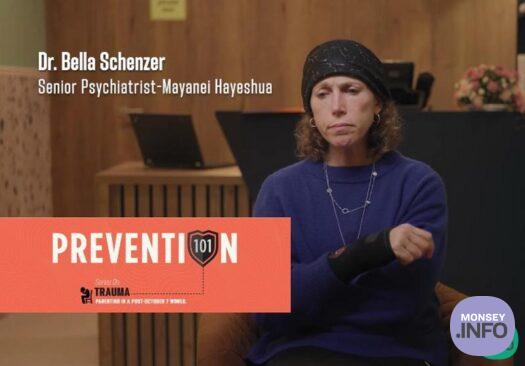
Prevention101: Series on Trauma: Episode #10 – Are There Different Types of Trauma?
Series on Trauma: Episode 10 – Parenting in a Post-October 7th World. The series addresses questions regarding trauma following the massacre of October 7th and the surge of global anti-Semitism.
Are there different types of trauma, such as hearing about other people’s trauma, like what’s happening in Israel, versus experiencing it yourself?
There is a well-described phenomenon of secondary trauma wherein individuals develop trauma responses not from experiencing an event firsthand but from hearing about it from others or witnessing it through media. Unfortunately, with the prevalence of social media, television, and online videos, this issue is becoming increasingly common.
The phenomenon of secondary trauma is well-documented, An example of this was seen after 9/11, where continuous media coverage and replaying of images from the event led to people experiencing trauma simply from watching the footage of the towers collapsing. It’s a concern with mental health providers as well. They can develop secondary trauma when listening to people discuss their trauma.
Understanding secondary trauma is important because, unfortunately, no matter how much you think you know about what your children are watching, they are seeing stuff you don’t realize. It’s an important conversation to have. You need to make sure you know what your children are seeing and hearing and how they are experiencing it.
Witnessing harm come to a loved one or someone close can be experienced as trauma. In real-time, the brain perceives it as a threat. Maybe not to you, but to your person. A loved one is part of our holistic life. When something bad, dangerous, or frightening happens to a loved one, or when we witness their death, the brain interprets it as an assault on our sense of wholeness and personal identity.
In America, many of us, especially youth, have been watching the horrific videos of October 7 over and over. Some are experiencing secondary trauma because of this. The extent of the consequences remains uncertain because experiencing a trauma doesn’t necessarily mean that someone will develop long-term symptoms.
There’s a rush to pathologize everything. We want to help, we want to cure, we want to treat, and we want to support, which is all amazing and important. At the same time, we also need to understand that the majority of people who are exposed to trauma will not have long-term symptoms. Even if they have acute symptoms, they still most likely will not go on to have long-term symptoms.
So, right now, have a lot of people all over the world within the Jewish community experienced trauma? One hundred percent yes, especially if they’ve been watching the videos. While it is so critical to be witnesses and to have firsthand testimony and images for the historical record, the downside is in today’s world people have access to all of this online. It’s hard for adults to watch it, but children, whose minds are still developing, are being exposed to horrors that no human being should ever see. The impact on them is concerning; we don’t know yet how it’s going to impact them long-term. They certainly are experiencing some form of trauma by watching these horrible videos again and again.
The body’s response to secondary trauma is similar to its response to direct trauma. This can make it challenging because somebody who experiences secondary trauma or vicarious trauma by watching videos can go on to develop symptoms similar to somebody who went through the trauma physically themselves. That said, it is important to remember the majority of individuals who go through any type of trauma will not develop long-term symptoms.









